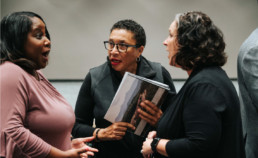Wilkes County August 2022
Population
65,806
County Seat
Wilkesboro
Median Income
$44,980
Population Density Designation
Rural
“You are listening to us. You are visiting us. Let’s keep this conversation going from this day forward. Thank you for allowing us to share our story and our authentic lived experiences,” said Yolanda Wilson, the Vice President of Instruction for Wilkes Community College (WCC), as our visit to Wilkes County opened.
Wilkes County is the birthplace of Lowe’s Home Improvement, Northwestern Bank, Holly Farms Foods and the iconic North Wilkesboro Speedway. WCC President Jeff Cox shared that entrepreneurship and self-reliance had driven much of the history of the county, but ultimately global economic trends led to companies selling to larger companies or moving their headquarters to larger metropolises. This led to the area facing one of the largest drops in median incomes in the United States over a twenty-year period, according to Cox.
The community had a decision to make in the face of these challenges.
The solution? “We decided to roll up our sleeves and get to work with a real focus on renewal,” declared Cox. “No institution can do this work alone, but we knew we had a role to play.”
WCC became laser-focused on bolstering student achievement and ultimately graduation rates as one tool for increasing social mobility. Kim Faw, Vice President of Instructional Support & Student Services for WCC, presented the college’s work to identify barriers to completion and access for their students. Nearly half of the students they worked with pointed to nonacademic barriers such as childcare, internet access and transportation as the primary causes for them potentially dropping out. As a result, the college created the WCC Resource Connections Center to unify resources, services and people who could assist their students. Faw proudly noted that every student the Center has served thus far has remained in college.
The college has also tried to serve as a catalyst for community action. Community leaders walked us through actions that are underway across an array of issues to provide for what Cox dubbed, “a steep, upward trajectory for this community.”
Collective action was the theme across an array of issues. Devin Lyall, the Director of Wilkes Recovery Revolution, pointed out that at one point Wilkes County didn’t have many resources to serve those struggling with recovery and addiction issues. Lyall was candid about her own struggles with addiction prior to beginning the work of Recovery Revolution, and she used her own journey to help determine their approach. They began with transitional housing before spinning up additional programs identified as needs by those they served.
Heather Murphy, the Executive Director of the Health Foundation of Wilkes County, spoke about how the Foundation is working hand-in-hand with community groups, philanthropy and government to put together a collective plan built around the vision of what Murphy calls, “a community where every person and child is safe, secure, healthy and able to thrive.”
“I want a future where a kid born in this county has the same life expectancy as a child born in North Carolina’s healthiest county instead of a life expectancy that is six years shorter,” declared Murphy.
This plan includes work around opioids and substance use alongside the Recovery Revolution, but also an investment in outdoor recreation and outdoor economies. They have put together a 15-year action plan predicated on targeting areas with the highest needs, leveraging natural resources and moving forward from there.
Craig Delucia, an advisor to the Herring Family Foundation, shared that their philanthropic work was built around a similar goal of expanding both the quality and length of life for residents of the county.
“We have some of the best internet in the state,” Delucia noted. The county has a high level of fiber connectivity compared to its peers, and the college and Foundation have together incubated a new nonprofit called NC Tech Paths that is hoping to help rural community members across northwestern NC gain access to tech jobs. Their emphasis is to help folks stay in the region and thrive in a global economy. This work will physically be manifested in a coworking space they will open soon — as well as a 15-week program that provides training and credentialing for information technology jobs (and similar fields) for students.
Delucia went on to share that they feel like their local talent outstrips the existing opportunities, so they decided to focus on the quality of opportunities they might provide. The Herring Family Foundation has gone on to make investments with an eye toward creating a river district alongside the Reddies River that runs through North Wilkesboro and Wilkesboro. They hope to create a space for “urban and creative renewal” for the county.
The community leaders assembled are clear-headed about the challenges that remain. A surge in tourism during COVID-19 has exacerbated an already existing challenge around affordable, accessible workforce housing. Median wages for the county are below the statewide average.
Childcare also remains a significant challenge as only 24% of children aged birth to five have access to care at a facility, but local philanthropists are funding a study that will both examine the challenges (such as the average cost of childcare being above in-state tuition, while childcare workers can be found in line at the local food bank due to low pay) and possible solutions for the county.
Blue Cross NC President and CEO, Dr. Tunde Sotunde, thanked them for sharing their stories.
“We must understand both your challenges and opportunities if we are going to serve you,” commented Sotunde. It is “collective will and a coalition of the willing” that will improve the health and well-being of our state, according to Sotunde.

Meet Dr. Algie Gatewood
Dr. Algie Gatewood is only the fourth President to lead Alamance Community College (ACC) since it opened in 1958. During Dr. Gatewood’s tenure at ACC, the college won its largest ever bond referendum – nearly $40 million – in 2018 to fund a number of major capital projects and expansions. The college also secured $16 million in county funding in 2014 to build the Advanced Applied Technology Center. Other notable accomplishments include creating a Biotechnology Center of Excellence, introducing an Early College, facilitating an apprenticeship program, and introducing nearly two dozen new academic programs and articulation agreements with state universities.
U39702, 12/22





